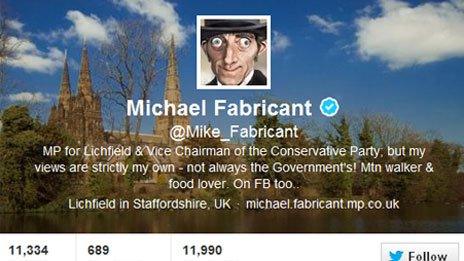'Swivel-eyed loons' or voice of the people?
- Published
- comments

David Cameron has had to reassure Conservative Party members no-one in his inner circle thinks they are "swivel-eyed loons". But does the row illustrate a deeper problem with British politics?
Political leaders arguably need party members more than the party members need them.
Without thousands of unpaid volunteers willing to stuff envelopes and knock on doors at election time, the party leaders would stand no chance of gaining power.
All the party members ask in return, they would argue, is a little respect. The feeling their views are being listened to, that they have some influence over the way the country is being run.
But how representative are those views of the wider electorate?
Some have argued the rows over same-sex marriage and Europe, which prompted the alleged jibe by a member of Mr Cameron's inner circle about "swivel-eyed loons", shows how out-of-touch Tory activists are with modern life.
It has, inevitably, been adopted as an ironic badge of honour by some Conservative traditionalists, such as party vice-chairman Michael Fabricant, who has adopted a new Twitter avatar depicting pop-eyed comedy legend Marty Feldman.
Rachel Sylvester, writing in the Times newspaper, external, says the row highlights a deeper problem affecting all three of the main parties at Westminster.
As party membership has shrunk, only the most committed and strident activists remain, which tends to make the parties less representative of the wider population than perhaps they would have been in the past, she says.
There is also a growing generation gap. Mr Cameron and the other main party leaders at Westminster are all in their 40s, while grassroots party members tend to belong to an older generation.
According to the Conservative campaign for Democracy the average age of Tory members is 68.
A report earlier this year suggested the average age of local councillors, across all parties, was 60.
There are, of course, plenty of younger political activists - and those with no party affiliation - who disagree with Mr Cameron's plans to legalise same-sex marriage.
But social issues often tend to divide along generational lines.
One recent opinion poll suggested the majority of under-40s would vote for a party that backed same-sex marriage, compared with 10% of those aged above 60.
An unnamed Tory source, quoted by Sylvester, says: "The activists are not swivel-eyed loons, they're your parents. They are conservative with a 'small c'."
The relative youth of Britain's political leaders feeds into a wider sense that they live in their own world, far removed from the concerns of ordinary voters.
The rise of UKIP, a party which currently has no MPs on the House of Commons benches, is seen by some as a howl of protest against an elitist, self-satisfied, and even sneering, political class at Westminster.
UKIP leader Nigel Farage never tires of berating Mr Cameron, Ed Miliband and Nick Clegg as "college kids" with no experience of the real world.
The anti-EU group claims to be the fastest growing political party in the country, with 26,000 members.
That is still a drop in the ocean compared with the mass political movements of days gone by.
Few are predicting a return to those days.
But it would be dangerous and wrong to write off mass-membership political parties as relics of the past, pundits on all sides have warned.
There are plenty of innovative ways in which party membership can be made a more attractive option to the next generation of politically motivated activists.
Mark Ferguson, writing on the grassroots Labour List website, external, says: "For the first party that really grasps what party membership could and should be like in the 21st Century, there are bountiful rewards."
- Published21 May 2013
- Published19 August 2011
- Published10 January 2013